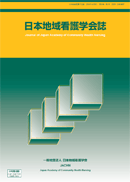
- Issue 3 Pages 6-
- Issue 2 Pages 4-
- Issue 1 Pages 4-
- |<
- <
- 1
- >
- >|
-
Akemi Mitsui, Junko Gora, Miho Shizawa2024Volume 27Issue 3 Pages 6-16
Published: 2024
Released on J-STAGE: December 24, 2024
JOURNAL FREE ACCESSPurpose: This study aims to clarify the process of building trusting relationships between public health nurses (PHNs) with limited experience and their child-rearing mothers.
Method: Thirty public health nurses with five years or less experience was interviewed and the obtained data was analyzed using a modified grounded theory approach.
Results: Three stages of the relationship building process between the PHNs and mothers emerged: “engaging through PHNs’ trial-and-error”, “beginning of cooperating relationship”, and “building the relationship together”. In the early stage of relationship building, the PHNs experienced “interacting with the mothers without sufficient understanding of them” while simultaneously experiencing “a struggle and anxiety in developing the relationship with them”. They tried “being sincere” and “capturing a general picture of mothers” to address the anxiety and distress. PHNs repeated these two processes until arriving at “feeling the change of the flow” where the relationship started to shift. The “mother-centered support” based on the PHNs’ accommodation to their mothers gradually transformed into “an equal relationship”. Subsequently, PHNs with “a sense of unity” with their mothers started “utilizing their knowledge and experience” to “strategize the next step together” which led to “building the relationship together”.
Discussion: It is suggested that providing focused support to help new PHNs overcome the first stage of relationship building “engaging through PHNs’ trial-and-error” will enable them to think about and practice their own methods of support, and formulate their own methods.
View full abstractDownload PDF (909K)
-
Focusing on the Initial Motivation Support InterviewYuko Shinagawa, Sumie Kuroda2024Volume 27Issue 3 Pages 17-25
Published: 2024
Released on J-STAGE: December 24, 2024
JOURNAL FREE ACCESSObjective: This study identified the practical details of effective online-specific health guidance provided by public health nurses and extracted basic data from the results for developing practical guidelines.
Methods: Semi-structured interviews were conducted with 20 public health nurses who had given an online initial motivation support interview at least 10 times. The results were analyzed following Krippendorff’s content analysis method.
Results: A total of 10 categories were extracted: “Communicate more carefully and meticulously than face-to-face interviews to obtain information about facial expressions, voice tones, and ges-tures, which are restricted through the screen, and also to reduce the psychological distance”; “To correctly convey the size of food and body movements through a web camera, adjust and devise the position of the camera and media used”; “Have the patient join the online interview in an environment which allows them to focus on the interview without being interrupted by unrelated matters”; “Take advantage of screen share function, such as the concentration of consciousness on the display screen and visualization of statements”; and “To consider concrete and feasible behavior modification, take advantage of being online in an everyday environment at home or in the workplace”.
Discussion: To build supportive relationships, public health nurses are trying to overcome communication barriers attributed to non-face-to-face conditions, resolve factors related to being online which inhibit health guidance, and effectively use the advantages of being online. In developing practical guidelines, each institution’s particularity and devices should also be considered.
View full abstractDownload PDF (873K) -
Akemi Okano2024Volume 27Issue 3 Pages 26-34
Published: 2024
Released on J-STAGE: December 24, 2024
JOURNAL FREE ACCESSPurpose: This study aimed to identify factors related to community general support centers providing life support to older adults with dementia, while seeking suggestions for improving coordination among dementia patients.
Methods: The study focused on the staff at community general support centers. The questionnaire included personal attributes, a coordination scale, knowledge of dementia (five factors), face-to-face relationships (seven factors ), elements of collaboration among the three professions (four factors), annual participation in community care meetings, and regional diagnoses. Multiple regression analysis was conducted using the scales of community general support centers to provide life support to older adults with dementia as an objective variable.
Results: A total of 259 participants were included in the analysis. Significant differences were observed in the “Basic understanding of dementia” subscale of understanding of dementia-related knowledge (β=0.203, p=0.009). Additionally, differences were noted in the “Understanding local resources” subscale (β=0.176, p=0.008), and the “Sharing mutual activities” subscale of elements of collaboration among the three professions (β=0.159, p=0.015). Finally, significant differences were observed in regional diagnoses (β=0.109, p=0.026).
Discussion: It is essential to understand dementia, local resources, and the area in charge, including mutual understanding among the three professions. The practice of district diagnoses and local care meetings was considered way to link these in practical activities.
View full abstractDownload PDF (794K)
-
Mina Ishimaru, Satoko Suzuki, Miyuki Ishibashi, Mayuko Tsujimura, Rie ...2024Volume 27Issue 3 Pages 35-42
Published: 2024
Released on J-STAGE: December 24, 2024
JOURNAL FREE ACCESS
- |<
- <
- 1
- >
- >|